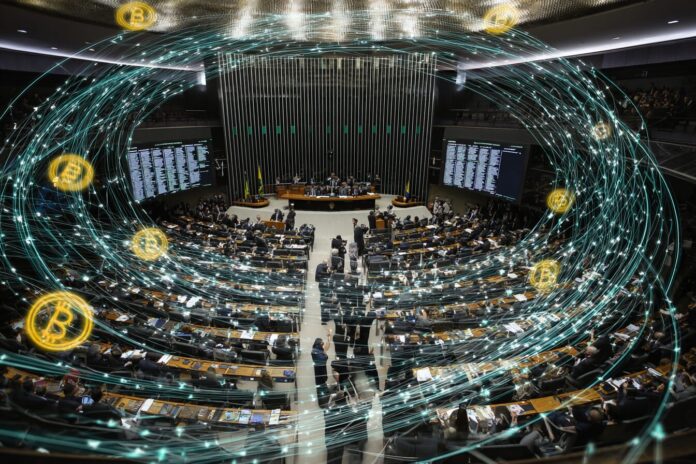Brazil is emerging as a pivotal arena for cryptocurrency regulation and reform within Latin America. In an era of rapid digital transformation, lawmakers are coming together to discuss sweeping changes that may significantly alter the landscape for digital asset trading. This includes the introduction of a flat 17.5% crypto tax that replaces previous progressive measures. Because the new tax removes long-held exemptions for small traders, both domestic and international investors are expected to experience higher compliance challenges.
Moreover, this discussion is intensified by concurrent revelations stemming from the ongoing Libra probe. Most importantly, regulators are now examining not only routine tax collection but also the broader implications of cross-border digital finance. Therefore, new insights from the probe underscore the heightened need for robust reporting frameworks across decentralized protocols.
A Bold Tax Reform: Understanding Brazil’s New Crypto Rules
On June 12, 2025, Provisional Measure 1303 was enacted, marking a dramatic transformation in Brazil’s cryptocurrency taxation system. Before this measure, investors enjoyed an exemption on monthly digital asset gains up to R$35,000. Now, however, every gain is subject to a flat 17.5% tax. Because this applies regardless of whether the assets are held in local exchanges, offshore platforms, self-custody wallets, DeFi protocols, NFTs, or staking platforms, both casual users and seasoned traders face uniform tax burdens. This update means that every crypto transaction is now more scrutinized and subject to rigorous reporting, as detailed by Cointelegraph.
Besides that, the tax calculation is updated on a quarterly basis, which offers a degree of operational clarity. However, this benefit is offset by the fact that any losses can now only be carried forward for one quarter starting from 2026, in contrast to the previous five-quarter carryover. As a result, investors must now plan more carefully. Consequently, these changes emphasize the need for enhanced fiscal management and real-time transaction monitoring.
Legislative Debate: Political Stakes and Economic Motivation
The proposed measure, championed by President Lula, is currently under close scrutiny in the Brazilian Congress. Legislators are set to deliberate on this initiative during a decisive hearing on August 6, 2025, with final agreement required by October 8, 2025. If Congress rejects or postpones the measure, the tax will automatically lapse after the 120-day window, according to updates from Binance.
Because this tax reform is part of a broader national effort to streamline fiscal policies, Brazil aims to widen its tax base while addressing revenue shortages. Most importantly, the government is striving to balance economic growth opportunities with the necessity of fiscal discipline. Legislators are also weighing the political implications of imposing uniform tax burdens across all market participants. Therefore, the debate encapsulates both political stakes and economic imperatives, aiming to stabilize the nation’s troubled fiscal landscape which saw a tax burden of over 32% of GDP in 2024.
Market Impact: How the 17.5% Tax Alters the Crypto Landscape
Retail investors now face substantial changes, particularly due to the elimination of previously enjoyed exemptions. Small transaction investors who once operated in a tax-free environment will now see increased costs. Furthermore, the uniform application of a 17.5% rate means there is no differentiation between casual users and high-frequency traders. This uniformity could discourage grassroots innovation and spark a migration to offshore exchanges, as noted by experts at ChainCatcher.
Most importantly, industry professionals warn that these measures might slow innovation in the rapidly evolving DeFi and NFT realms. Because the tax applies equally, it risks stifling the growth of decentralized markets. Besides that, exchanges and wallet providers may incur higher compliance costs as they adapt their systems to meet new reporting standards. Therefore, while the reform is designed to increase state revenue, it may also introduce unintended consequences for market agility and investor participation.
Libra Probe: What the New Revelations Tell Us
The prospect of tighter regulation is further underscored by the revelations emerging from the ongoing Libra probe. This investigation into international stablecoin and token projects reveals that many digital assets operate within legal gray areas. Because these projects use gaps in traditional oversight to their advantage, Brazilian authorities are considering stricter reporting mandates. As a result, new policies may enforce more robust cross-border data-sharing agreements, bringing deregulated zones under closer scrutiny.
Moreover, the findings from the Libra probe have propelled lawmakers to rethink existing regulatory frameworks. Most importantly, this episode highlights the need for standardized protocols that transcend national boundaries. Because international crypto dealings are becoming increasingly significant, improved regulatory cooperation could help prevent financial misconduct across global markets. Therefore, the ongoing probe has ignited a broader debate on digital asset oversight, as referenced by multiple industry sources like CryptoRank.
Looking Forward: What’s Next for Crypto in Brazil and Latam?
Brazil’s upcoming congressional debate will almost certainly set a dramatic precedent for the region. Most importantly, as the largest economy in Latin America, Brazil’s regulatory approach is likely to influence neighboring countries grappling with similar challenges in digital finance. Because crypto adoption remains robust across the continent, many expect that further tax reforms will soon emerge to standardize digital asset regulation. Therefore, other nations may adopt similar flat-tax rules, albeit with potential side effects for both innovation and investor inclusion.
In addition, industry experts anticipate that the resolution of Brazil’s crypto tax debate could encourage further regulatory developments. Most importantly, stakeholders across the board—from developers to retail investors—should prepare for a market where compliance becomes ever more critical. Because both domestic and cross-border activities are under the microscope, the future of digital asset trading in Latin America promises to be an environment of high stakes and rapid regulatory evolution.
The outcome of this debate, coupled with global moves toward comprehensive digital regulation, will likely shape market dynamics for years to come. Therefore, keeping abreast of these changes is essential. As Brazil navigates these pivotal legal and fiscal reforms, it provides a blueprint for broader trends in the digital asset sector across Latin America.
Sources:



